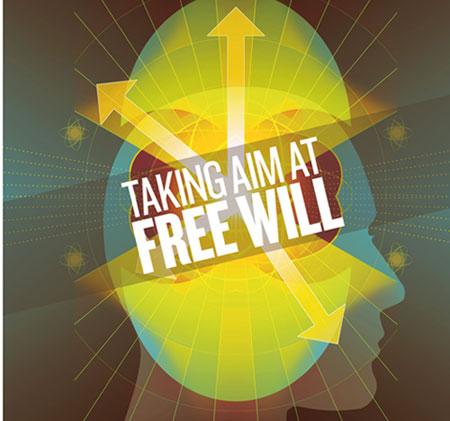Since the days of Aristotle, and later Descartes, thinkers have sought to explain consciousness and free will. Several thousand years on and we are still pondering the notion; science has made great strides and yet fundamentally we still have little idea.
Many neuroscientists now armed with new and very precise research tools are aiming to change this. Yet, increasingly it seems that free will may indeed by a cognitive illusion. Evidence suggests that our subconscious decides and initiates action for us long before we are aware of making a conscious decision. There seems to be no god or ghost in the machine.
From Technology Review:
It was an expedition seeking something never caught before: a single human neuron lighting up to create an urge, albeit for the minor task of moving an index finger, before the subject was even aware of feeling anything. Four years ago, Itzhak Fried, a neurosurgeon at the University of California, Los Angeles, slipped several probes, each with eight hairlike electrodes able to record from single neurons, into the brains of epilepsy patients. (The patients were undergoing surgery to diagnose the source of severe seizures and had agreed to participate in experiments during the process.) Probes in place, the patients—who were conscious—were given instructions to press a button at any time of their choosing, but also to report when they’d first felt the urge to do so.
Later, Gabriel Kreiman, a neuroscientist at Harvard Medical School and Children’s Hospital in Boston, captured the quarry. Poring over data after surgeries in 12 patients, he found telltale flashes of individual neurons in the pre-supplementary motor area (associated with movement) and the anterior cingulate (associated with motivation and attention), preceding the reported urges by anywhere from hundreds of milliseconds to several seconds. It was a direct neural measurement of the unconscious brain at work—caught in the act of formulating a volitional, or freely willed, decision. Now Kreiman and his colleagues are planning to repeat the feat, but this time they aim to detect pre-urge signatures in real time and stop the subject from performing the action—or see if that’s even possible.
A variety of imaging studies in humans have revealed that brain activity related to decision-making tends to precede conscious action. Implants in macaques and other animals have examined brain circuits involved in perception and action. But Kreiman broke ground by directly measuring a preconscious decision in humans at the level of single neurons. To be sure, the readouts came from an average of just 20 neurons in each patient. (The human brain has about 86 billion of them, each with thousands of connections.) And ultimately, those neurons fired only in response to a chain of even earlier events. But as more such experiments peer deeper into the labyrinth of neural activity behind decisions—whether they involve moving a finger or opting to buy, eat, or kill something—science could eventually tease out the full circuitry of decision-making and perhaps point to behavioral therapies or treatments. “We need to understand the neuronal basis of voluntary decision-making—or ‘freely willed’ decision-making—and its pathological counterparts if we want to help people such as drug, sex, food, and gambling addicts, or patients with obsessive-compulsive disorder,” says Christof Koch, chief scientist at the Allen Institute of Brain Science in Seattle (see “Cracking the Brain’s Codes”). “Many of these people perfectly well know that what they are doing is dysfunctional but feel powerless to prevent themselves from engaging in these behaviors.”
Kreiman, 42, believes his work challenges important Western philosophical ideas about free will. The Argentine-born neuroscientist, an associate professor at Harvard Medical School, specializes in visual object recognition and memory formation, which draw partly on unconscious processes. He has a thick mop of black hair and a tendency to pause and think a long moment before reframing a question and replying to it expansively. At the wheel of his Jeep as we drove down Broadway in Cambridge, Massachusetts, Kreiman leaned over to adjust the MP3 player—toggling between Vivaldi, Lady Gaga, and Bach. As he did so, his left hand, the one on the steering wheel, slipped to let the Jeep drift a bit over the double yellow lines. Kreiman’s view is that his neurons made him do it, and they also made him correct his small error an instant later; in short, all actions are the result of neural computations and nothing more. “I am interested in a basic age-old question,” he says. “Are decisions really free? I have a somewhat extreme view of this—that there is nothing really free about free will. Ultimately, there are neurons that obey the laws of physics and mathematics. It’s fine if you say ‘I decided’—that’s the language we use. But there is no god in the machine—only neurons that are firing.”
Our philosophical ideas about free will date back to Aristotle and were systematized by René Descartes, who argued that humans possess a God-given “mind,” separate from our material bodies, that endows us with the capacity to freely choose one thing rather than another. Kreiman takes this as his departure point. But he’s not arguing that we lack any control over ourselves. He doesn’t say that our decisions aren’t influenced by evolution, experiences, societal norms, sensations, and perceived consequences. “All of these external influences are fundamental to the way we decide what we do,” he says. “We do have experiences, we do learn, we can change our behavior.”
But the firing of a neuron that guides us one way or another is ultimately like the toss of a coin, Kreiman insists. “The rules that govern our decisions are similar to the rules that govern whether a coin will land one way or the other. Ultimately there is physics; it is chaotic in both cases, but at the end of the day, nobody will argue the coin ‘wanted’ to land heads or tails. There is no real volition to the coin.”
Testing Free Will
It’s only in the past three to four decades that imaging tools and probes have been able to measure what actually happens in the brain. A key research milestone was reached in the early 1980s when Benjamin Libet, a researcher in the physiology department at the University of California, San Francisco, made a remarkable study that tested the idea of conscious free will with actual data.
Libet fitted subjects with EEGs—gadgets that measure aggregate electrical brain activity through the scalp—and had them look at a clock dial that spun around every 2.8 seconds. The subjects were asked to press a button whenever they chose to do so—but told they should also take note of where the time hand was when they first felt the “wish or urge.” It turns out that the actual brain activity involved in the action began 300 milliseconds, on average, before the subject was conscious of wanting to press the button. While some scientists criticized the methods—questioning, among other things, the accuracy of the subjects’ self-reporting—the study set others thinking about how to investigate the same questions. Since then, functional magnetic resonance imaging (fMRI) has been used to map brain activity by measuring blood flow, and other studies have also measured brain activity processes that take place before decisions are made. But while fMRI transformed brain science, it was still only an indirect tool, providing very low spatial resolution and averaging data from millions of neurons. Kreiman’s own study design was the same as Libet’s, with the important addition of the direct single-neuron measurement.
When Libet was in his prime, Kreiman was a boy. As a student of physical chemistry at the University of Buenos Aires, he was interested in neurons and brains. When he went for his PhD at Caltech, his passion solidified under his advisor, Koch. Koch was deep in collaboration with Francis Crick, co-discoverer of DNA’s structure, to look for evidence of how consciousness was represented by neurons. For the star-struck kid from Argentina, “it was really life-changing,” he recalls. “Several decades ago, people said this was not a question serious scientists should be thinking about; they either had to be smoking something or have a Nobel Prize”—and Crick, of course, was a Nobelist. Crick hypothesized that studying how the brain processed visual information was one way to study consciousness (we tap unconscious processes to quickly decipher scenes and objects), and he collaborated with Koch on a number of important studies. Kreiman was inspired by the work. “I was very excited about the possibility of asking what seems to be the most fundamental aspect of cognition, consciousness, and free will in a reductionist way—in terms of neurons and circuits of neurons,” he says.
One thing was in short supply: humans willing to have scientists cut open their skulls and poke at their brains. One day in the late 1990s, Kreiman attended a journal club—a kind of book club for scientists reviewing the latest literature—and came across a paper by Fried on how to do brain science in people getting electrodes implanted in their brains to identify the source of severe epileptic seizures. Before he’d heard of Fried, “I thought examining the activity of neurons was the domain of monkeys and rats and cats, not humans,” Kreiman says. Crick introduced Koch to Fried, and soon Koch, Fried, and Kreiman were collaborating on studies that investigated human neural activity, including the experiment that made the direct neural measurement of the urge to move a finger. “This was the opening shot in a new phase of the investigation of questions of voluntary action and free will,” Koch says.
Read the entire article here.


 Neuroscientists continue to find interesting experimental evidence that we do not have free will. Many philosophers continue to dispute this notion and cite inconclusive results and lack of holistic understanding of decision-making on the part of brain scientists. An
Neuroscientists continue to find interesting experimental evidence that we do not have free will. Many philosophers continue to dispute this notion and cite inconclusive results and lack of holistic understanding of decision-making on the part of brain scientists. An  [div class=attrib]From Scientific American:[end-div]
[div class=attrib]From Scientific American:[end-div]